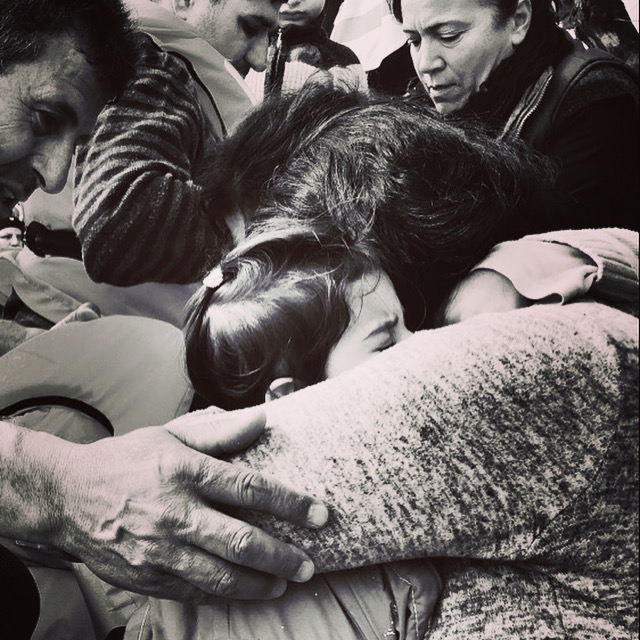… On a beach outside the town of Mytilíni, Lesvos at 0030 February 22, 2016.
Drowning people
I stand with my binoculars and look at a low, dark line on the horizon. A few seconds later it is confirmed: It is a RIB. A black rubber boat. It is always anxious to see how low in the water they float.
And how many people there are. We can barely glimpse the contrast of them out in the dark. We count heads. I lose track when I turn thirty. I know there are at least 50 there. Probably closer to 60.
In a boat made for hot sunny days and twenty people. It is 6 degrees, the wind from the south is bitterly cold, the waves are not so high near the shore, but we know that out there – over the sea of 10 kilometers that separates Greece from Turkey – there are big waves. Waves that easily overturn a small rubber boat.
Waves that have overturned boats and drowned more than 3,000 people in the last year and over four hundred in the last month alone.
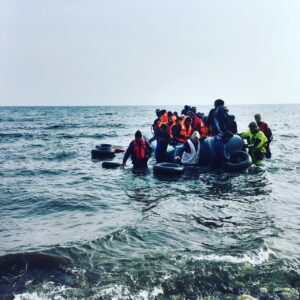
A missing toddler
Tommy, one of the Greek rescue team ERCI, got the boy out, gave him a heart massage and kept him alive until the ambulance showed up…
I step out of the row, holding the little child’s body close to me. He falls asleep from the heat from me and for a few minutes we stand in our own bubble and I can observe the series of fates that fit in front of me.
A thirteen-year-old – he could have been any teenager from anywhere – is helped out of the boat. The boy cries, more out of shame than out of fear. Everyone sees that he has peed on himself. Someone puts a blanket around him, hides him and he disappears onto the beach.
My thought is what fears it takes for a 13 year old to pee on himself. A few minutes later we emptied the boat. I find the parents of the toddler I have had in my arms.

A total caos
The boat is approaching. Our rescuers are in the water. It is important to cut the engine before it pushes the RIB ashore.
We will try to get the front of the boat towards the beach and help the refugees ashore, one by one.
A few minutes later we are standing in two rows. I see the people sitting in the boat. Faces can be seen, pale and wet. Faces characterized by joy, crying, fear and insecurity.
Are they safe or is this just another disappointment? Some traffickers cynically exploit the vulnerability of the refugees. They promise them Greece for thousands of euros and drive them only to another beach in Turkey.
Kids scream, adults cry. Some have fainted. The first one I receive is a little boy. A few months old. He has vomited all over, but with a finger in his neck I feel that he is warm. These are the kids we are most anxious of.
They cool down quickly and when they stop shaking and stop crying, there is danger. The refugees gather children and women in the middle of the boat. A rational action to protect them.
It will get worse
… I turn to the beach again. Raises the binoculars and looks for the next boat.…
We get up from the water. Children get warm clothes, adults get blankets. Some good souls have made hot tea in large containers.
Before we get that far, we have to climb a slope. In the middle of the slope I see an elderly lady. She stands on her knees, comes no way and I see that she is crying.
I help her up, support her and think that this should not be the case. Children should not drown, boys should not pee in fear and old people should not kneel crying on a hillside in Greece.
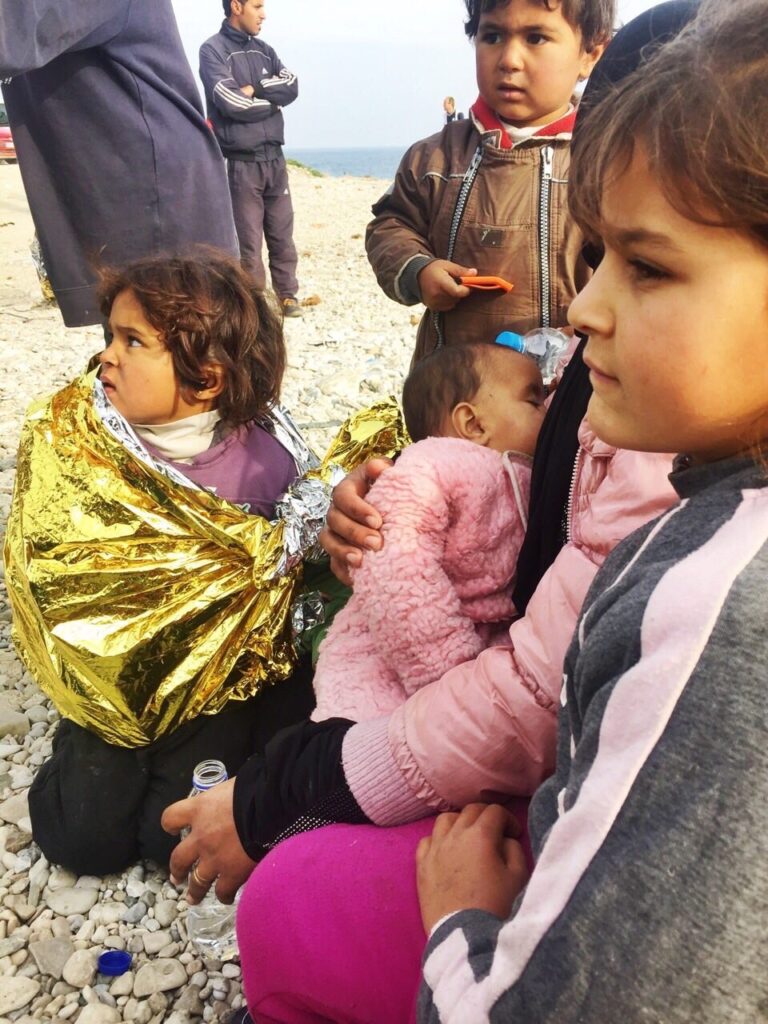
The Greek rescue team, Erci
The disadvantage is that the water is often thrown into the boat and it is slowly filled with water. When we get them out, seawater and vomit flow there.
The other day, a three-year-old drowned in the murky water. Tommy, one of the Greek rescue team Erci, got the boy out, gave him a heart massage and kept him alive until the ambulance showed up.
He is now on a respirator in Athens. Nobody knows how it goes. We cross our fingers that a robust little body and cold seawater might save him. The mother is alone with two other children. His father died in Aleppo.
Again a few minutes later, just before the UNCHR bus arrives to take the refugees to the Moria registration camp, I help the elderly man with the black garbage bags he has tied around his legs.
At first he did not want help, the elderly have a desire to fend for themselves. A final touch of dignity on a journey that is anything but worthy.
Finally, he needs help, some fingers that are soft and warm enough to loosen the ropes. Under the plastic bags he has nice shoes. They were originally freshly refurbished.
Always a next boat
I notice that those who come wear their finest clothes. They that lost everything in the old country and hope to find a new life here with us, in Schengen.
We see the bus run. Some of us wave, the kids’ faces sticking to the windows. With some of them we have brought out the smile.
We give them bananas, sweets and water. And a lot of hope that life will be better from now on. With a heavy heart, I know it’s not true. This is just the beginning of a long journey that gets worse and worse the further north in Europe they come.
I turn to the beach again. Raises the binoculars and looks for the next boat.
Moria fire.
On 8 September 2020, a fire badly damaged the camp of more than 12,000 asylum seekers.
On 10 September, three Greek ships were sent to help shelter the migrants. B
y then, the camp was almost completely destroyed. Most of the refugees were left homeless on the street.

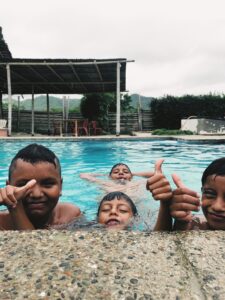
What is a lifetime, really?
Twenty good years? A good friend of mine once said while walking in the mountains of Gran Canaria.“Knut, we have twenty good years left. Use

How to protect yourself from your PTSD, when the world is on fire
(It is war. And it is mine. ) The headlines that meet me today are about the war in Ukraine. Alarms going off, people fleeing,
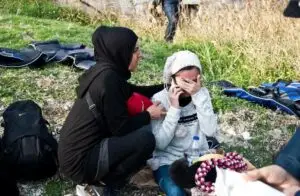
The thin film of civilization
The thin film of civilization This picture are taken on Lesvos. Her husband and baby drowned on the way over from Turkey. This is a
